LGBT freshers: 'I worried Oxford wouldn't accept me'
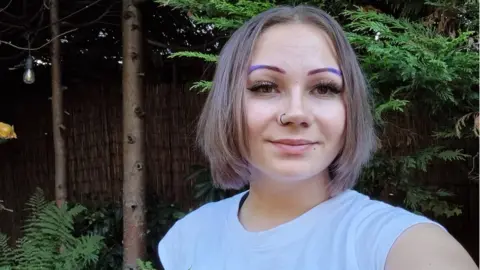 Julia
JuliaWhen Julia went for her University of Oxford interview she considered changing her appearance to fit in.
With her pink and purple eyebrows - her take on the bisexual Pride flag - she was concerned that she wouldn't fit the mould of what the university was looking for.
"I like to do my make-up in a queer way, so I went and spoke to our Oxbridge officer about toning my make-up down for my interview. They said 'no, they literally want you to be yourself'.
"It's so comforting to know I got accepted for me and didn't have to pretend to be someone else to get in."
'Bullying discouraged me from coming out'
Julia didn't come out as bisexual at school, after witnessing the hard time given to other LGBT pupils.
"The few gay or bi kids got really bullied, which discouraged me from coming out," she says.
Her religious school also didn't offer much in the way of sex education, which didn't help, she says.
But she has since come out to her family, and as she gets ready to move away from her town in Yorkshire, she says she can't wait to get immersed in a big LGBT community at Oxford.
"At university you can be as weird or different as humanly possible, and there will still be someone there to accept you. At sixth form, there's a couple of hundred people and it's harder."
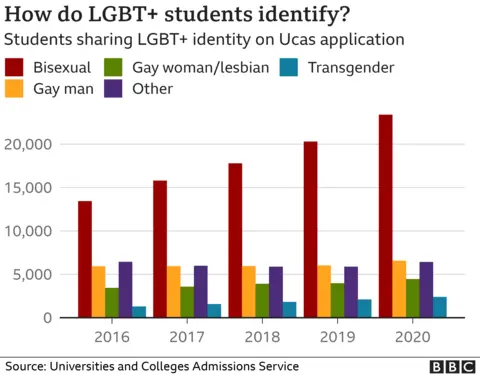
Of the 600,000 UK university applicants applying through admissions service Ucas in 2020, 7.2%, or 40,000, described themselves as LGBT.
That's a rate two-and-a-half times higher than the overall adult population, the admissions service estimates.
The Ucas report, which was produced in collaboration with Stonewall, also found that:
- LGBT students are more likely to be from disadvantaged areas - 17% as opposed to 13% of those who said they were heterosexual or didn't specify.
- One in three LGBT students has a disability, including half of trans applicants, compared with just over one in 10 non-LGBT students.
- And 13% have a mental health condition, compared with 3% of non-LGBT students.
- The number of students describing themselves as bisexual increased by 71% between 2016 and 2020.
"Our report highlights the varying support needs of LGBT+ students, with mental health in particular a prominent concern," Ucas chief executive Clare Marchant says.
"It also highlights where LGBT+ students do not have a positive experience in education, this can be linked to bullying or not feeling part of an inclusive environment. We are encouraging schools and colleges to have policies and procedures in place to support LGBT+ students."
'There's lots of people you can talk to'
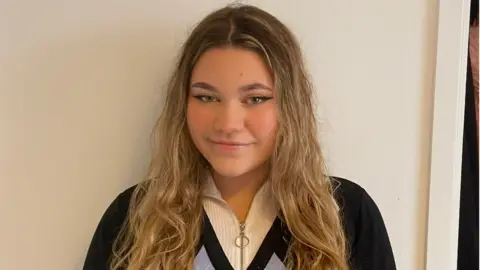 Mia
MiaMia, who is also bisexual, has just started as a musical theatre fresher at Anglia Ruskin University in East Anglia.
Like Julia, she didn't want to come out at school after witnessing a lot of LGBT bullying.
"It was more segregated...they kind of bubbled everyone in a group and labelled them as gay as an insult," she says.
She arrived at university determined to not let to prejudice stop her from enjoying her time there, but says she needn't have worried.
"No-one cares at university. And if you do have a problem, there's loads of people you can talk to, so that's been good. They've made it clear that if you ever experience anything like that, go to course leaders."
'This label was stuck to me'
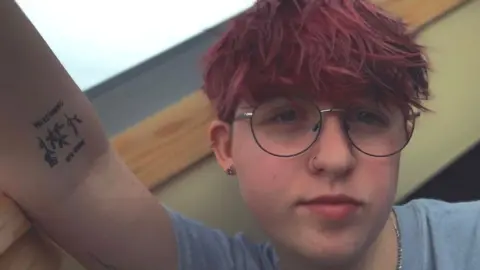 Oliver
OliverUcas also conducted a more in-depth survey of 3,000 LGBT students, and found that 82% were planning to be open about their sexuality or gender identity at university.
But second year student Oliver, who is trans, chose not to tell people unless there was a specific reason.
"I just chose not to tell people at uni, because when I was at home I felt it was stuck to me as a label. I just wanted to be me and not have a back story, so I just chose not to tell people unless I wanted to or felt like I needed to.
"My flatmates I told for my safety, because I didn't want anyone to have a problem with it and for me to be out in an unsafe environment."
He also told his lecturers because he knew that the effects of starting fertility preservation and hormone treatment might make studying hard at times.
Oliver says he's had "nothing but positive experiences" with the university,
"There was basically no diversity in my village. not many different ethnicities, races, sexualities or gender identities, so I was worried.
"There was the general stuff at school where the boys or girls would have jokes about stuff which, when I heard, I was worried to come out, but I've had no negativity from anyone."
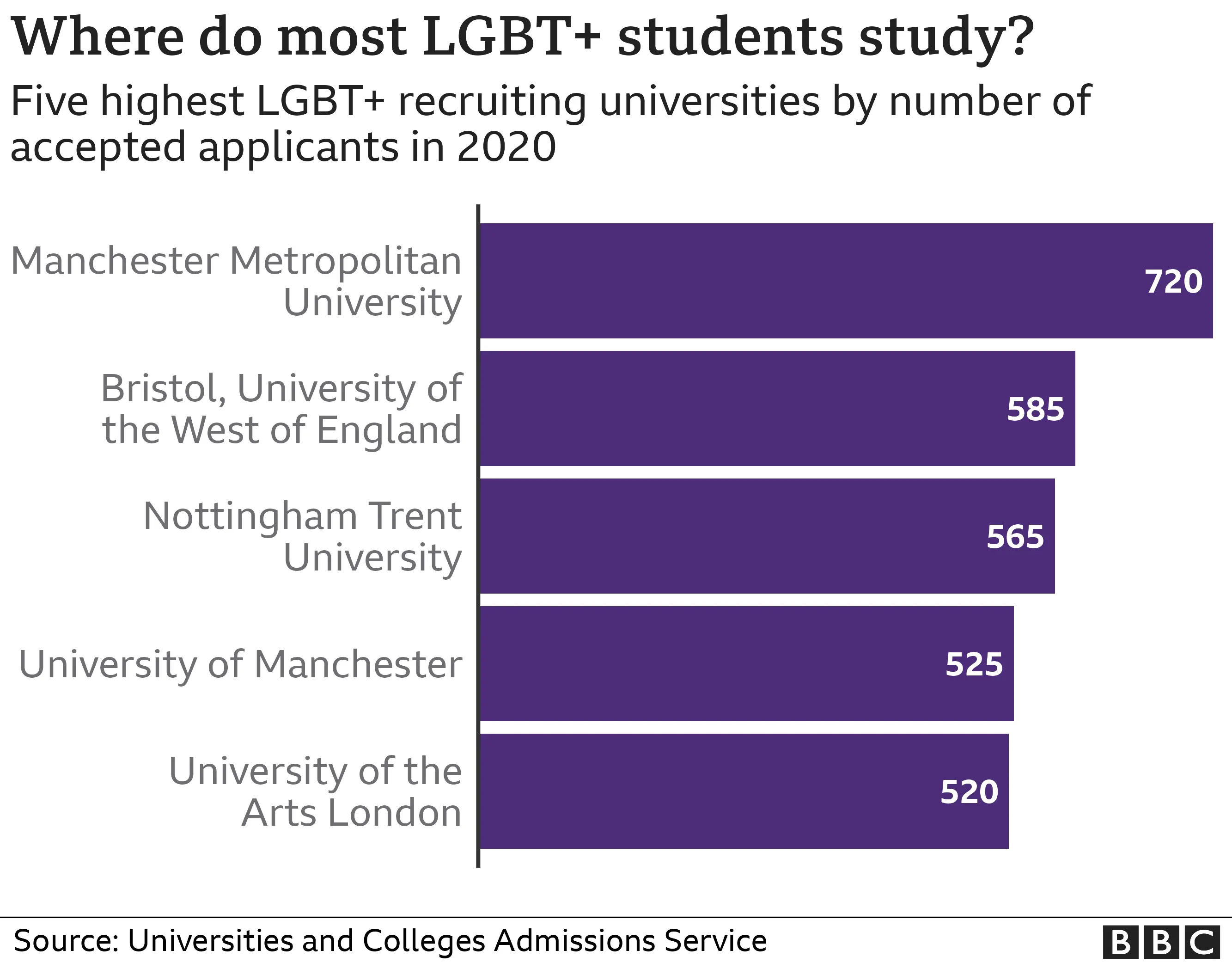
Jack, a second year student in Gloucestershire, said he felt obligated to stay local and help establish an LGBT scene in the area.
There aren't any gay bars nearby, but the university allowed him to arrange a drag night on campus, which helped create a network of LGBT friends.
"The one thing the university could do is hold more Pride-based events on campus. Pride is a celebration of the community, but the events they have are small and not well attended.
"If they were promoted better for incoming freshers they might see it and feel so 'seen', maybe for the first time in their life."
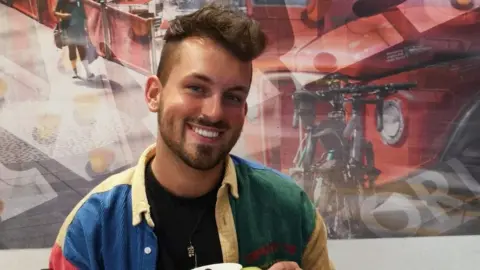 Jack
JackHe advises the new students to be patient with themselves.
"Don't allow others to rush you to come out. You might know you're gay or bi or trans, but you should never feel under pressure - you should only do it for yourself because you don't owe it to anyone."
